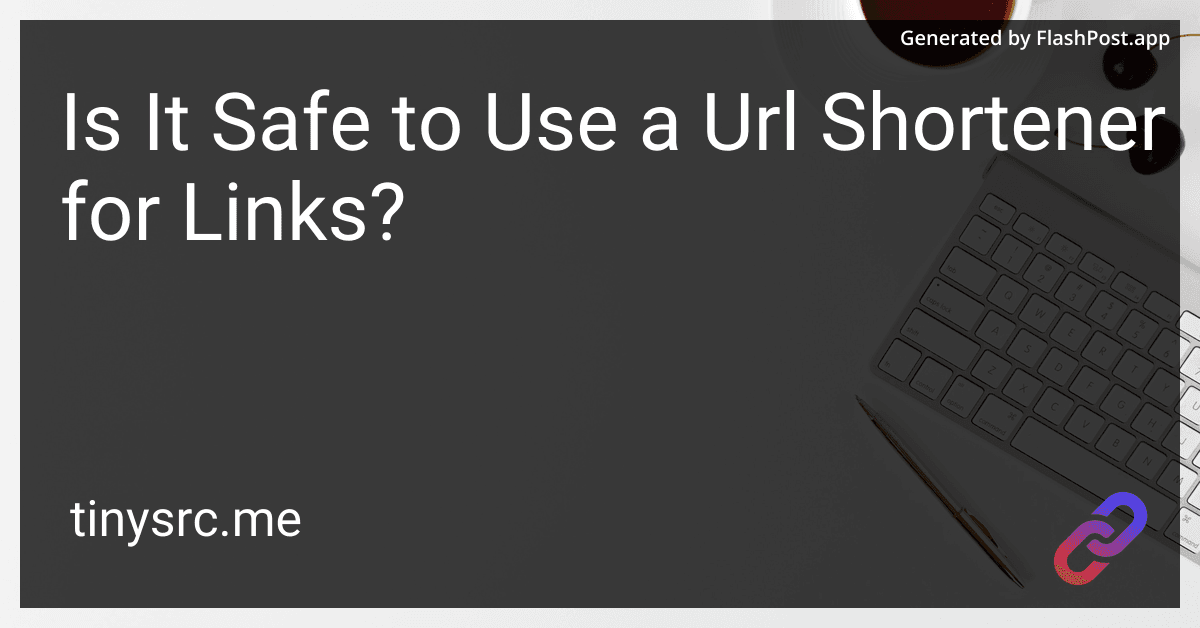In today's digital world, sharing URLs efficiently and conveniently is essential. One popular solution is the URL shortener service, which allows you to compress lengthy URLs into short, easy-to-share links. But with this convenience comes a common question: Is it safe to use a URL shortener for links?
In this article, we will explore the safety of using URL shorteners, focusing on the benefits and potential risks, and how to ensure you’re using a trusted service like TinySRC for your link shortening needs.
What is a URL Shortener?
A URL shortener is a tool that reduces a long URL into a shorter version, making it more manageable for sharing on platforms like social media, emails, or text messages. By shortening a URL, you make it more visually appealing and easier to remember.
For example, a long and complicated URL like [https://devhubby.com/thread/how-can-i-mock-a-method-in-go](https://devhubby.com/thread/how-can-i-mock-a-method-in-go) can be shortened to [https://gosrc.cc/go/C3dcpHONg](https://gosrc.cc/go/C3dcpHONg) using a URL shortener.
Benefits of Using a URL Shortener
Before diving into safety concerns, it’s important to recognize the benefits of using a URL shortener:
- Cleaner Links: Shortened URLs are easier to share, type, and remember.
- Tracking Capabilities: Many URL shortening services offer the ability to track how often a link is clicked, where it’s being clicked from, and other useful analytics.
- Increased Engagement: Short URLs are more user-friendly and look professional in emails or on social media.
- Branding Opportunities: With custom shorteners, businesses can create branded short links that reinforce their identity.
Is It Safe to Use a URL Shortener?
The safety of using URL shorteners depends largely on the service you choose. Reputable URL shorteners, such as TinySRC, offer robust security features to protect both the link creator and the end user. Here’s what to consider:
Trustworthy Services:
When choosing a URL shortener, it’s crucial to use a trusted service. Platforms like TinySRC are widely recognized for offering secure and reliable URL shortening services. They ensure that your shortened links are safe to share and won't redirect to malicious websites.
Redirection Risks:
One of the main concerns about URL shorteners is that they can hide the final destination of a link. This has led to concerns about phishing or redirecting to harmful websites. A trustworthy service like TinySRC ensures that shortened URLs lead to secure and legitimate destinations.
Link Expiry and Control:
With some URL shortening services, links may expire after a certain period or the service may become inactive. This could make it difficult for recipients to access your links in the future. Reputable services like TinySRC provide stable, long-lasting links with no expiration dates, so you can rely on them for long-term use.
Link Analytics:
One of the perks of using URL shorteners is the ability to track analytics like clicks, geographic location of users, and referral sources. While this can be a great tool for marketing purposes, it’s essential to choose a service that protects user privacy and offers transparency in data collection practices. TinySRC ensures secure analytics while respecting user privacy.
Avoiding Spam:
Untrustworthy URL shorteners may allow malicious or spammy links to be created, leading to scams or harmful content. Always use a reputable service like TinySRC to ensure that your links are free from malware or viruses. TinySRC's advanced algorithms prevent malicious URLs from being shortened, keeping your links safe.
How to Ensure Safe URL Shortening
To make sure that you’re using URL shorteners safely, follow these tips:
- Use Reputable Services: Stick to trusted services like TinySRC, which are known for their reliability and security.
- Preview Shortened Links: Before clicking on a shortened URL, especially if you don’t trust the source, use a preview feature (if available) to see where the link leads. TinySRC offers this feature to ensure users can verify the destination of shortened URLs.
- Don’t Use Suspicious Links: If you receive a shortened link from an unknown or untrusted source, avoid clicking it until you can verify its legitimacy.
- Check for SSL Certificates: Ensure the final destination URL is secure by checking if the website has an SSL certificate (indicated by “https” in the URL).
Conclusion
URL shorteners are a great tool for simplifying links and improving user experience. When used properly, they are completely safe and offer many advantages, including easy sharing, tracking, and branding opportunities. However, to ensure safety, it’s important to use a trusted service like TinySRC. With TinySRC, you can confidently shorten your links without worrying about security risks, while enjoying the benefits of clean and user-friendly URLs.
For more information on how to shorten your URLs safely, visit TinySRC today.




